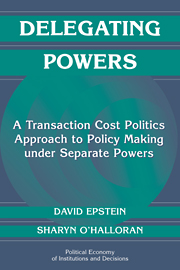Book contents
- Frontmatter
- Contents
- List of Figures and Tables
- Preface
- 1 PATHS OF POLICY MAKING
- 2 CHOOSING HOW TO DECIDE
- 3 TRANSACTION COST POLITICS
- 4 THE DECISION TO DELEGATE
- 5 DATA AND POSTWAR TRENDS
- 6 DELEGATION AND CONGRESSIONAL-EXECUTIVE RELATIONS
- 7 DELEGATION AND LEGISLATIVE ORGANIZATION
- 8 DELEGATION AND ISSUE AREAS
- 9 CONCLUSION
- AN AFTERWORD ON COMPARATIVE INSTITUTIONS
- APPENDICES
- A Proofs from Formal Model in Chapter 4
- B Sample of Public Laws
- C Sample Coding Sheet
- D Coding Rules for Discretion
- E Gridlock Interval and Other Measures of Interbranch Conflict, 1947–1992
- F Coding Rules for Roll-Call Votes
- G Committee Hearings Data
- References
- Index
- Titles in the series
G - Committee Hearings Data
Published online by Cambridge University Press: 02 December 2009
- Frontmatter
- Contents
- List of Figures and Tables
- Preface
- 1 PATHS OF POLICY MAKING
- 2 CHOOSING HOW TO DECIDE
- 3 TRANSACTION COST POLITICS
- 4 THE DECISION TO DELEGATE
- 5 DATA AND POSTWAR TRENDS
- 6 DELEGATION AND CONGRESSIONAL-EXECUTIVE RELATIONS
- 7 DELEGATION AND LEGISLATIVE ORGANIZATION
- 8 DELEGATION AND ISSUE AREAS
- 9 CONCLUSION
- AN AFTERWORD ON COMPARATIVE INSTITUTIONS
- APPENDICES
- A Proofs from Formal Model in Chapter 4
- B Sample of Public Laws
- C Sample Coding Sheet
- D Coding Rules for Discretion
- E Gridlock Interval and Other Measures of Interbranch Conflict, 1947–1992
- F Coding Rules for Roll-Call Votes
- G Committee Hearings Data
- References
- Index
- Titles in the series
Summary
Committee hearings data were collected for two purposes: first, to gauge the relative extent to which congressional committees oversee the federal bureaucracy; second, to measure the average “informational intensity” of the issues that fall within the jurisdiction of a congressional committee. This section outlines how these data were collected and compiled.
DATA SOURCE
We relied on a third-party commercial vendor, Congressional Information Service, Inc. (CIS), which publishes summaries of all published committee hearings. CIS also makes these summaries available on-line. We obtained these on-line briefs and created a file containing all the hearings held by each standing committee from the 80th to 103d Congress. We used two of CIS's products: Congressional Masterfile 1 and Congressional Masterfile 2. The former provides an on-line summary of each published hearing from the second session of the 91st Congress through to the present (or, at the time of the study, the 103d Congress). The latter provides a summary of each published hearing and a summary of selected unpublished hearings. The congressional masterfiles come with their own extraction software, which allows the researcher to search by using keywords, subject, date of hearings, or serial set number. As our needs are somewhat specialized, we were forced to rely on our own search engines, which we now detail.
DATA EXTRACTION METHOD
To analyze this data, we wrote two UNIX shell script programs. The first program counted the number of times a particular committee held hearings during a Congress.
Information
- Type
- Chapter
- Information
- Delegating PowersA Transaction Cost Politics Approach to Policy Making under Separate Powers, pp. 295 - 300Publisher: Cambridge University PressPrint publication year: 1999
